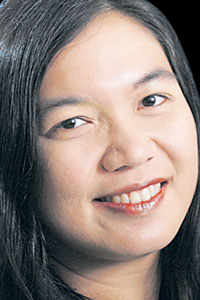Angel child dolls, or luk thep in Thai, have become widely known since the middle of last year and increasingly popular, especially among those in the entertainment business who believe the dolls bring them good fortune. The trend for luk thep -- dolls with added spirits of angels that are believed to have the power to fulfill the wishes of their owners -- has become a centre of criticism since a number of owners treat their dolls as if they are real infants in public.
According to collectors, angel child dolls are made of vinyl and stuffed with cotton and grains, reflecting fertility. The surfaces of their limbs are painted to look like human skin. They wear make-up and beautiful clothes. Sacred letters are written on their foreheads. These dolls are priced between a few thousand baht to tens of thousands of baht, while the rituals to add spirits to the dolls cost between 200-20,000 baht. More than 40,000 users follow the Facebook page "Ban Luk Thep", which features photos of angel child dolls of various sizes ranging from 5-24 inches.
The craze has prompted several airline and bus companies, even restaurants, to offer special services for these dolls. On Instagram and Facebook pages for luk thep owners, there are a number of shops selling clothes and accessories. A few beauty salons, hotels and restaurants offer luk theps the same services as their humans. There are also services like child care (which includes bathing, feeding, teaching and taking the luk thep for a walk), food supplements and graphic design schools. The list goes on and on.
On Jan 22, a Thai airline started to allow passengers to reserve seats for their dolls by using the same information as their owners and adding an SSR Code, "Angel Child". Nonetheless, there is a condition that passengers with their dolls can take only window seats and must avoid the rows 41-42 and 34, which are reserved for passengers who need special assistance. All angel child dolls must wear seat belts during take-off and landings, and will be served with snacks and beverages.
Later, a senior executive of the airline said the new rule is aimed to prevent conflicts with passengers since an aviation regulation disallows passengers to place bags or big things on their laps, and instead have to store them in overhead compartments. So far, about 20 passengers have brought their angel child dolls aboard and some of them asked for orange juice and water for their luk thep. No one, however, has bought a ticket for a luk thep, yet.
Meanwhile, the state-owned Transport Company, which operates passenger buses nationwide, offers a 50% discount for angel child dolls and will serve food and beverages to the dolls. So far, a number of passengers have brought these dolls along and placed them on their laps. In addition, a private-owned bus company has announced that it is ready to sell tickets and serve food and drinks to the dolls. It has asked all staff to treat these dolls as passengers.
And, that's not all. A buffet restaurant has launched a campaign to welcome luk thep to dine in, under a few conditions. It charges the luk thep according to their height. The eating advice for luk thep is similar to human customers -- to eat in moderation and to pay fines for leftover food.
While the trend is desirable for many, it causes concern for some. National Police Chief Pol Gen Chakthip Chaijinda reportedly worries that criminals might hide narcotics or other illicit things inside angel child dolls. He has ordered police officers at all checkpoints to examine the dolls carefully.
A university lecturer posted on his Facebook wall that he does not forbid his students from bringing their dolls to his methodology class. However, he requires all participating dolls to answer questions and do homework and turn in research papers. In addition, their "parents" must be responsible for all costs and failures in their luk thep's studies.
Sinchai Chaojaroenrat, a theologist, posted on his Facebook wall: "No matter how silly carrying a luk thep looks, this conduct is a religious right similar to those wearing amulets, tattoos or religious clothes, headbands or hijabs. However, there is an exception in case that carrying such a doll is against any laws, social norms or morals."
While some people regard luk thep as "friends" for single people or couples who have no children, some others think luk thep have the magical power to fulfill their wishes. A few Buddhist monks reportedly warn people to return to mindfulness and refrain from superstitious beliefs.
Personally, I couldn't agree more with the Department of Mental Health, which came out and said that this trend is probably just a social fad and is likely to be caused by people's insecure feelings and tendencies to seek something their mind can rely on. This fad is indeed influenced by social media and will fade away soon like the Tamagotchi and Furby crazes in the past.
I think it's wise to also listen to the health authorities who reportedly suggest angel child doll owners adhere to established religious doctrine and accept that blessings come from doing good deeds.
Pichaya Svasti is a writer of the Life section of the Bangkok Post.
